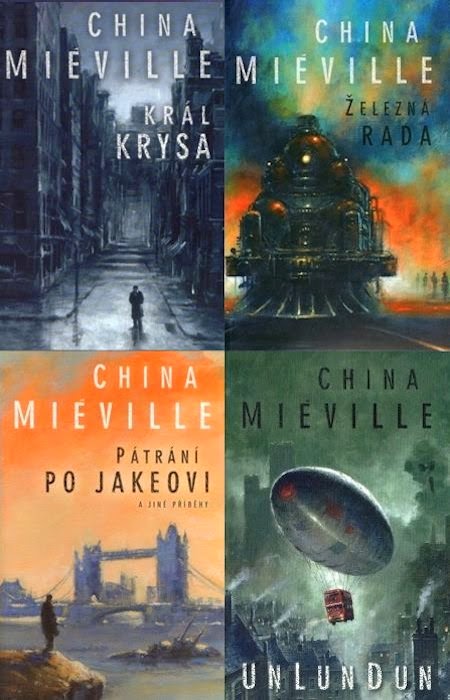Buy this book from
"Deep in the research wing of the Natural History Museum is a prize specimen, something that comes along much less often than once in a lifetime: a perfect, and perfectly preserved, giant squid. But what does it mean when the creature suddenly and impossibly disappears?
"For curator Billy Harrow it's the start of a headlong pitch into a London of warring cults, surreal magic, apostates and assassins. It might just be that the creature he’s been preserving is more than a biological rarity: there are those who are sure it’s a god.
"A god that someone is hoping will end the world."
***
The single most surprising thing about Kraken is that, when you get right down to it, it's a comedy. Of course there's more to the latest from multiple award-winning author China Mieville than a wicked sense of humour and some canny wordplay - truly, a great deal more - but when all is said and done, Kraken is an elaborate, endlessly imaginative joke topped off with a punch-line that will take your breath away.
Meet Billy Harrow. An unremarkable curator in London's world-renowned Natural History Museum, Billy's crowning glory is the preservation of a particularly impressive giant squid. Guiding an excited tour-group around the facility one afternoon, he makes a mind-boggling discovery: the nine-metre giant squid, encased in a tank containing thousands of litres of Formalin, has vanished. His first thought, having come upon an ominous absence where the museum's star attraction stood only moments before, echoes the utter bafflement of all those who clamour around the scene of the crime. "What the hell?" indeed.
The guards know nothing; Billy's fellow employees haven't a clue; nor do the police have a scooby as to how someone could possibly have disappeared such a monstrous specimen. Only when the FSRC - the Fundamentalist and Sect-Related Crime unit - pressgang Billy into an unsettling interview does the unlikely hero of Kraken begin to understand how very different London is from the city he thought he knew. The cult squad are a bunch of crazies themselves, but whatever Billy's qualms about Kath, Baron and Vardy, they serve to start him on an apocalyptic journey into the capital's hidden underworld; a journey which takes in all the darkly fantastic sights anyone who's read Mieville in the past will be familiar with.
Which isn't to say that Kraken represents the same old Mieville with a few new tricks. Certainly it treads on ground that the noted New Weird author's devoted readership will recall from the likes of King Rat and Un Lun Dun, literally in the first instance - Mieville does love his London, and in Kraken, London is the world - but also figuratively insofar as Mieville mines such customary subjects as politics, religion and revolution. But he excavates in those very metaphorical mines some extraordinary new material: an astonishing array of cultures and creeds easily the equal of those which made his trilogy of Bas-Lag books so beloved. And the London of Kraken is a city distinct from those Londons Mieville has surveilled in the past.
Of all the author's storied back-catalogue, Kraken most resembles a real-world Perdido Street Station in its unrelenting urban environs - even the sea, you will see, is encased in concrete - though to call Mieville's latest urban fantasy is to do it a grave disservice given the lamentable misappropriation of the term in recent memory. In its thematic concerns and narrative progression, too, Kraken is most similar to the Bas-Lag books: hardly a chapter goes by without a fascinating potted history of one invented faith or race or another - be it the union of magical familiars, the legion of Londonmancers, an embassy of the sea. Some will surely revolt at the notion of a story interrupted for an infodump apropos of apparently nothing, but in time Mieville wraps up each and every one of his demented inventions into the novel's narrative tissue with a deft touch and a fiendishly sinister sense of humour.
Muster up the concentration to penetrate Mieville's characteristically dense prose and you'll find your efforts amply rewarded, but patience is, as ever, a requirement when reading the work of this master craftsman. And yet, outside of Un Lun Dun, Kraken is without a doubt Mieville's most accessible novel to date - though there's no single thing you can point to as conclusive proof of its somewhat commercial sensibilities. Rather, it is a cunning conjunction of forces which work, in coalition, to render Kraken a more approachable narrative: the veracity of its vivid setting, a city whose boundaries are drawn in blood and stone and ink; the popular Lovecraftian connotations of its be-tentacled subject matter; the refinement of Mieville's powerful prose over the years.
Not to mention the author's fiendishly sinister sense of humour, and the whimsical tone with which he tells the tale. A man wearing a Gundam T-shirt practices extreme origami; a body "listlessly [humps] the stony shoreline with the slap-slap of the water"; the Lolcats make an appearance which I won't spoil; while characters discuss the notion of "squid pro quo" and the "squiddity" of how "martyrs [might] emerge from martyrdom's other side." Mieville's is a wit quite without equal. Pointed and gleefully profane, culturally aware but not for a second restrained by mere reality, his narrative turns on misunderstanding, on literal trickery, but none of Mieville's capricious play robs Kraken of its sophistication.
In its way, it is, for all its revelry, as impactful an experience as The City and The City, together with which this novel marks a startling new chapter in the continuing evolution of both the New Weird and its most powerful proponent, Mieville himself. There is nothing stagnant about these waters. Poetic, demented, surprisingly approachable and seething with intelligence, Kraken is a cracking read, no doubt about it.
***
Kraken
by China Mieville






